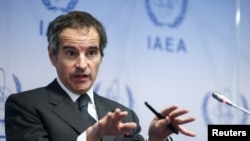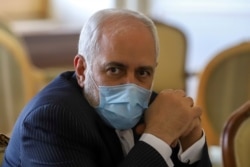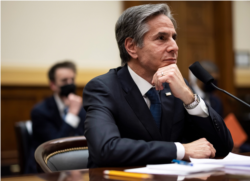Iran and the U.N.’s nuclear watchdog have agreed to extend an agreement for monitoring of Iran’s nuclear activities for one month.
“The equipment and the verification and the monitoring activities that we agreed will continue as they are now for one month expiring on June 24th, 2021,” International Atomic Energy Agency Director-General Rafael Grossi told reporters Monday.
The extension comes amid ongoing negotiations to revive the 2015 international agreement that limited Iran’s nuclear program in exchange for sanctions relief.
Iranian Foreign Minister Mohammad Javad Zarif said Monday that the lifting of U.S. sanctions imposed under former President Donald Trump’s administration is “a legal and moral obligation,” not something to be used as leverage in those negotiations.
“Didn’t work for Trump — won’t work for you,” Zarif tweeted.
His comments came a day after U.S. Secretary of State Antony Blinken said it is not clear whether Iran will comply with restrictions on its nuclear development program in order to have U.S. economic sanctions removed.
“Iran, I think, knows what it needs to do to come back into compliance on the nuclear side, and what we haven’t yet seen is whether Iran is ready and willing to make a decision to do what it has to do,” Blinken told ABC’s “This Week” show. “That’s the test and we don’t yet have an answer.”
Iran has been in indirect talks with the United States through diplomats from other countries in reshaping the 2015 international nuclear deal to restrain Tehran’s nuclear ambitions. Iran has said its nuclear program is for peaceful purposes.
Then-President Trump withdrew the United States from the pact in 2018, imposing new sanctions on Iran’s oil, banking and shipping sectors. But U.S. President Joe Biden is looking to rejoin the pact that includes Britain, France, Germany, Russia and China.
In a separate interview, Blinken told CNN that the United States and Iran have “actually made progress” in the talks in Vienna and a fifth round is scheduled in the coming days.
Iranian President Hassan Rouhani said last week that the United States was ready to lift trade sanctions, although a senior Iranian official later contradicted him. European diplomats said difficult issues remained in the negotiations.
Iran has maintained that for it to return to the deal, the U.S. must first lift its sanctions, while the U.S. says Iran must first return to compliance with the deal’s terms.
Iran has consistently breached the 2015 pact’s restrictions on uranium enrichment, but Blinken told CNN if both sides can return to the original deal, “then we can use that as a foundation both to look at how to make the deal itself potentially longer and stronger — and also engage on these other issues, whether it’s Iran’s support for terrorism ... its destabilizing support for different proxies throughout the Middle East.”
But he told ABC, “The first thing that we need to do is put the nuclear problem back in the box.”












